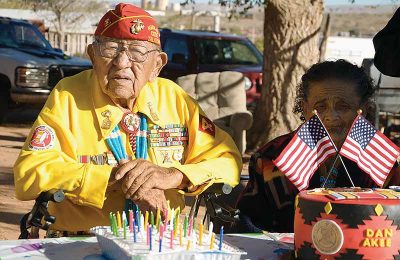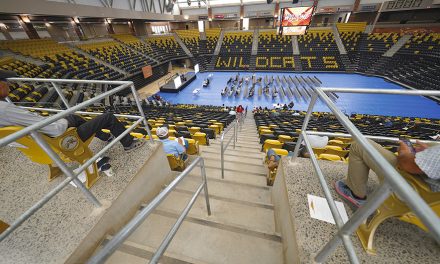
Code talker inspired many at 2010 Memorial Day event
By Anne Worthington
Special to the Times
On Memorial Day 2010, the staff of Montezuma Castle National Monument in Camp Verde, Arizona, hosted an educational program by Navajo Code Talker Dan Akee, who was joined by his wife Margaret and family.
The public was invited to share memories with Sgt. Major Akee and learn about the history of the code talker initiative during World War II.

Navajo Times | Krista Allen
Dressed in his yellow Code Talker shirt, Dan Akee poses for the camera before blowing out 94 candles at his home in Tónaneesdizí on Veterans Day.
In addition to reminding the audience of the impact the code talkers had on the outcome of the war, a major theme of the presentation was the continuing legacy and importance of preserving indigenous languages.
The 400 Navajo Code Talkers were recruited in 1942 and left their homeland for the Pacific Theater, using their Native language to develop a system of communication that could not be broken by the Japanese.
The program in Camp Verde was inspired by the contributions of Mae Franklin of Cameron, Arizona, who served as the tribal liaison officer for the Coconino and Kaibab National Forests.
That year, Franklin organized several educational programs in northern Arizona where Akee would talk to students and the public about the code talkers, their contributions and sacrifices.
A resident of Tuba City, Akee was a member of the U.S. Marines, 25th Marine Regiment, 4th Marine Division, Pacific Theater.
He saw action at Saipan and Tinian in the Northern Marshall Islands and Iwo Jima.
Akee explained that Philip Johnston of Flagstaff, a veteran of World War I who grew up on the Navajo Reservation and spoke some of the language, came up with the idea to transmit and receive messages through radio and telephone communication.
The Navajo Code Talkers were able to communicate under the most adverse conditions, from tanks, planes and while under fire.
It is estimated that about 375 to 420 Navajos served as code talkers and Akee explained that they were sworn to secrecy. The program was classified until 1968.
The “Honoring the Code Talkers Act” was signed into law in 2000 and six months later the first 29 soldiers received the gold Congressional medal of honor. The silver Medal of Honor was then awarded by President George W. Bush to Akee and his fellow Marines. He shared his medal with the audience.
Last week I thought how proud he and the other Marines would have been of new Marine Corps graduate Pvt. Jordan Peshlakai (Navajo Times May 13) in front of the San Diego Marine Corps Depot Museum in San Diego.
She is literally walking in their footsteps!
Akee explained that Native recruits fluent in other indigenous languages, such as Hopi, Cherokee, Seminole and others, also participated and he especially cited Choctaw soldiers who transmitted coded messages in World War I.
A modest man, he reminded the audience that all of the code talkers were honored that day and that all represented the best of American ingenuity, bravery, dedication, sacrifice and resilience.
This educational program reached visitors of all ages and it was the privilege of NPS staff to meet Akee and gain his perspective on history and the role of the code talkers in protecting the country. Both he and Mrs. Akee passed in 2016.
Also in attendance that day was one Pacific Theater veteran who survived Tinian and Iwo Jima and as he thanked Akee he explained, “I absolutely know without a doubt that if it was not for you and the other code talkers, I would not be here today.”
After the applause and standing ovation, there was not a dry eye in the place as we all found shared common ground honoring not only this soldier, but all veterans who sacrificed so much to defend our nation.







 Highway 264,
Highway 264, I-40, WB @ Winslow
I-40, WB @ Winslow